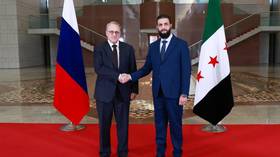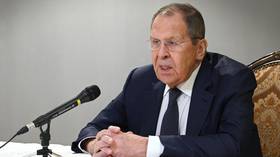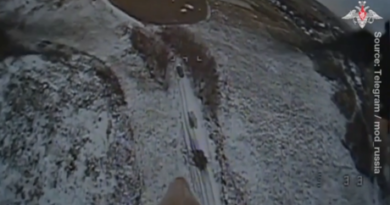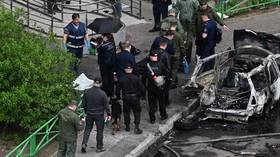Why the Russian Army needs more military priests — RT Russia & Former Soviet Union

300 priests are not enough: — Russian Orthodox Church calls for reinforcements for army’s clergy
Moscow’s army is facing a spiritual shortfall and the Russian Orthodox Church has highlighted an urgent need for more military clergy to care for soldiers and officers. Speaking at the 33rd International Educational Christmas Readings in Moscow this week, Metropolitan Kirill of Stavropol and Nevinnomyssk revealed that, while 300 priests currently serve in military roles, the number actually required stands at 1,500. This shortage comes at a time when the Church sees its role as crucial in addressing the moral and spiritual challenges facing soldiers during the Ukraine conflict.
Fighting the “Mischief” of War
One of the key tasks of military priests, according to participants at the readings, is to combat the “mischief” that emerges in individuals involved in combat operations. This includes countering the “sinful spirit of revenge” that can take hold in soldiers grieving for lost comrades. Archpriest Demetrius Vasilenkov, Deputy Chairman of the Synodal Department for Cooperation with the Armed Forces, stressed the significance of their work: “The role of military priests is the main condition for victory in this war.” He emphasized that a faithful soldier “knows the meaning of this war very well–he is fighting for the truth” and, even in the face of brutality, does not allow himself to be dehumanized.
The Church also views neo-paganism as a rising threat within the military, as it encourages “animalistic qualities” that can erode moral foundations. Archpriest Demetrius warned that the enemy’s goal is to provoke soldiers into responding to atrocities with their own, thereby driving them into sin and depriving them of divine assistance. He underscored the importance of faith in combat, saying, “A believer finds it easier to face the line of fire and defy death.”
Nominal Christians in a Time of War
Archpriest Svyatoslav Churkanov, assistant to the chief military priest in the Ukraine conflict zone, noted a troubling trend: “At present, the majority of our soldiers are baptized but nominal Christians.” Many, he said, struggle to process the chaos and horrors of war without a strong spiritual foundation. “Revenge becomes their first instinct,” he observed, adding that priests must work tirelessly to dissuade soldiers from succumbing to such impulses.
Father Svyatoslav shared his personal experience of counseling soldiers grappling with the loss of comrades and the overwhelming flow of negative information online. He called for more priests to volunteer for service in the conflict zone, where many clergy are experiencing emotional and spiritual fatigue due to the intense demands of their work. “This war affects and will affect all of us. The sooner we realize that, the sooner it will all be over,” he said.
Addressing a Crisis of Spirit
Metropolitan Kirill lamented the absence of deeper spiritual and moral foundations among soldiers. “A person who has taken part in hostilities can become more embittered, consumed by hatred,” he warned. “In war, it is necessary to remain human and, above all, Christian–not to become part of the evil.”
Archpriest Andrey Kanev, assistant to the commander of the Central Military District, echoed this sentiment, describing the early days of the Ukraine conflict as a period of confusion and lack of direction within the ranks. “There was a visible crisis in psychological and political work within the troops,” he said. The lack of guidance even extended to commanders, with some unable to find the words to inspire their units.
To address these issues, Father Andrey advocated the revival of catechism (teaching the basics of Christian doctrine) within the military and the inclusion of religious studies in military educational institutions. “Our army is spiritless; we need to work hard on this,” he stated. He also urged priests to engage soldiers before they enter combat zones, saying, “Faith in war does not mean correct religiosity, but it is a start.”
Miracles on the Battlefield
Despite the challenges, the Church highlighted stories of miraculous occurrences on the battlefield. “There are no atheists in war,” said Archpriest Konstantin Tatarintsev, citing accounts of divine intervention that had saved lives. A short film shown at the readings featured soldiers who survived direct hits thanks to objects of faith–a cross deflecting a bullet or an icon hidden in a passport.
One soldier recounted how he rescued an icon from a church under attack and later survived cluster shelling unscathed. “The icon saved me,” he said. Another battalion shared a story of a direct strike on their shelter, which left them unharmed inside a glowing “protective cocoon.” They attributed their survival to an icon of Saint Bartholomew, which was destroyed in the blast.
The readings also showcased the myrrh-streaming icon of the Mother of God “Softening of Evil Hearts,” which has traveled through conflict zones, offering spiritual solace to soldiers. Sergey Fomin, the icon’s custodian, recalled how it accompanied Dmitry Medvedev during his meetings with US President Barack Obama in 2010, coinciding with the signing of significant agreements. “It was undoubtedly connected with the icon,” he said.

A Call for Reinforcements
Metropolitan Kirill called for urgent action to address the shortage of military priests, announcing plans to open a master’s program with a military focus at the Rostov Theological Seminary. He also emphasized the need for early selection and training of candidates to ensure they are prepared for the unique challenges of ministering to soldiers.
Colonel-General Valery Baranov, former commander of the United Group of Forces in the North Caucasus, urged the government to pass legislation providing state guarantees for military priests. “For those priests who died in the conflict zone, it has taken too long to provide for their families,” he said, calling it a matter of faith and statehood. He also advocated the canonization of Generalissimo Alexander Suvorov, arguing that his inclusion in prayers would strengthen the spiritual foundation of the armed forces.
The Way Forward
The participants of the Christmas Readings concluded that the role of military priests is indispensable in maintaining the morale and humanity of soldiers. “Work, brothers,” urged Father Andrey, encapsulating the collective call to action. The Russian Orthodox Church sees its mission as not only supporting soldiers spiritually but also preserving the moral fabric of the nation during a time of unprecedented challenges.
This article was first published by the newspaper Kommersant and was translated and edited by the RT team.



